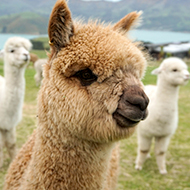Study to further understanding of Scottish camelid sector

Keepers of llamas and alpacas in Scotland are being asked to share their views of the sector in a short survey.
Researchers have launched a new initiative to further understanding of the camelid sector in Scotland.
Led by Scotland's Rural College (SRUC), the project comes in response to the growing popularity of llamas and alpacas, with many being bred in the country for specialist treks and other experiences.
The project, funded by the Scottish Government as part of its Strategic Research Programme, will investigate how keepers in Scotland record information about their animals, including those they buy and sell.
It also aims to gauge what matters to those who care for camelids, so their perspectives may be taken into account when making policy choices. As part of this, keepers of llamas and alpacas in Scotland are being asked to share their views of the sector in a short survey.
SRUC veterinary epidemiologist Madeleine Henry said: “The camelid sector is growing in Scotland, but the current extent and the needs of our camelid population are less visible than those of other species kept on farms, crofts, paddocks and smallholdings.
“We are asking camelid keepers to tell us more about their animals, to allow better assessment of potential methods of future support for the sector in Scotland.”



 The RCVS has announced a new version of its 1CPD mobile app, with enhanced features for veterinary surgeons and veterinary nurses to record their continuing professional development.
The RCVS has announced a new version of its 1CPD mobile app, with enhanced features for veterinary surgeons and veterinary nurses to record their continuing professional development.